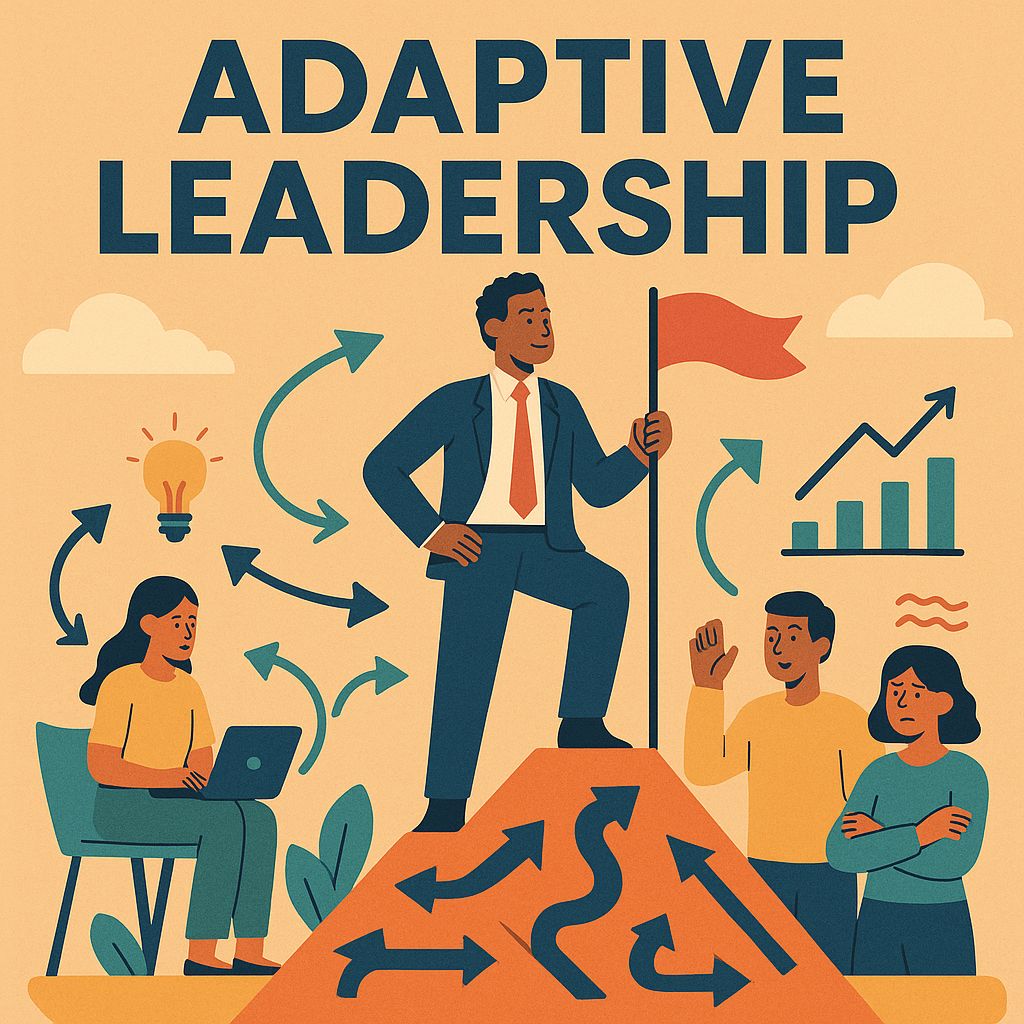
In today’s world, leaders are called to show up differently.
We live in a time of nonstop disruption, pandemics, AI revolutions, economic shock, etc., but beyond the headlines, something quieter and more personal is unfolding. People are tired, uncertain, even afraid. And so are their leaders.
This is where adaptive leadership comes in, not just as a framework, but as a human-centered approach to leadership in a world that refuses to stand still.
What then is Adaptive Leadership?
At its heart, adaptive leadership is about showing up when the playbook runs out.
First developed by Harvard professors Ronald Heifetz and Marty Linsky, the concept challenges leaders to make a shift from solving problems for people to collaboratively helping them solve complex challenges. Adaptive challenges are not only about fixing broken machines or adjusting spreadsheets; they are the messy, emotional, and ambiguous stuff like restructuring a team, letting go of outdated ways of working, or building trust where it’s been lost.
Heifetz puts it beautifully: “People don’t resist change. They resist loss.”
That’s the real work of leadership: helping people process the discomfort of change, not just its strategy.
What Adaptive Leadership Looks Like in Real Life
The COVID-19 pandemic tested the leaders around the world. There was no manual. No certainty. Just fear and confusion. The leaders who survived did not pretend to have all the answers. Instead, they listened more. They empowered their teams.
In a Harvard Business Review piece, five core principles emerged from this moment that remain timeless:
- Distribute the Work of Leadership: Leadership is not just a title, it’s a behavior. Great leaders empower others to step up, even in uncertainty.
2. Stay Open to Emergence: Plans change. Adaptive leaders they expect change and build flexibility into how they lead.
3. Acknowledge the Emotional Toll: Change is personal. Leaders must understand the fear, grief, or confusion that transformation brings, and respond with empathy.
4. Communicate with Radical Honesty: People can handle bad news better than silence. Trust grows when leaders are transparent, even when the answers are uncomfortable.
5. Learn Out Loud: Adaptive leaders treat every mistake as a masterclass. They mine setbacks for insight and share the learning.
These are not crisis-only tactics. They are timeless skills for tackling some of the hardest challenges of our age, like inclusion, hybrid work, and digital transformation.
The Pressure to Evolve Is Real and So Is the Opportunity
Former Cisco CEO John Chambers once said: “AI improves at five times the rate of the internet and has three times the impact. That renders old strategies obsolete.”
In other words, yesterday’s leadership is not good enough for tomorrow’s world. But here’s the good news: adaptive leadership is not about being perfect, it’s about being willing.
A recent study in the Journal of Leadership Studies found that leaders who practice adaptive behaviors like active listening, cross-functional collaboration, and co-creation spark higher innovation and engagement in their teams. People not only follow adaptive leaders, but they also grow under them.
How Do We Grow Adaptive Leaders?
Here’s what organizations and leaders can do to create more adaptive capacity:
- Build a culture of curiosity: Don’t punish mistakes. Celebrate smart questions and thoughtful reflection. Make learning visible.
- Create psychological safety: Let people speak up without fear of judgment. That’s where your best ideas are hiding.
- Break the silos: The best solutions come from strange bedfellows. Bring finance to the marketing table. Invite operations into innovation conversations.
- Teach adaptability like a skill: Emotional intelligence, strategic thinking, and self-awareness are all learnable. Start early, and start often.
And above all, model it. Be the kind of leader who admits when you’re unsure, who invites feedback, and who stays curious. That vulnerability is not weakness, it’s courage.
The Final Word: Leadership with Meaning
Heifetz once wrote: “Exercising adaptive leadership is about giving meaning to your life beyond your own ambition.”
If you take nothing else from this, take that.
We do not need more heroic leaders with all the answers. We need real ones, who sit with the discomfort, lead with humility, and guide their teams through the fog, not away from it.
In the end, adaptive leadership is not just about navigating change. It’s about being changed, and helping others do the same.
References
2. https://hbr.org/2020/09/5-principles-to-guide-adaptive-leadership
4. https://www.researchgate.net/publication/373361067_ADAPTIVE_LEADERSHIP

